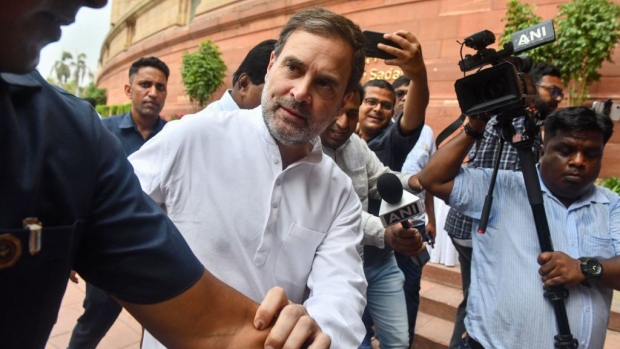Jun 27, 2024
Rahul Gandhi Shares the Stage With Modi After Years in His Shadow
, Bloomberg News

(Bloomberg) -- For years, Rahul Gandhi and his political allies watched from a lowly perch as Prime Minister Narendra Modi consolidated his power across India.
On Wednesday, Gandhi found himself in a new position: sharing a stage in Parliament with Modi and shaking his hand. It was the result of the once-beleaguered Indian National Congress delivering a stunning setback to Modi’s ruling party, picking up dozens of parliamentary seats during national elections that thrust Gandhi into the spotlight.
“Allow us to represent the voice of the people of India,” Gandhi, 54, said in his first speech as leader of the opposition.
The moment was replete with symbolism. Gandhi’s ascension to a post that’s been vacant for the past decade under Modi’s majority rule officially makes him the prime minister’s chief rival. It also marks a new chapter in his political career and that of the powerful Gandhi dynasty, which ruled India for much of the nation’s recent history but has lately struggled to connect with voters.
With the loss of its parliamentary majority, Modi’s Bharatiya Janata Party will now have to work more closely with Gandhi and regional leaders, who promised voters more jobs and welfare for the poor. They’ve vowed more debate over the passing of bills, setting up a more contentious legislature than the rubber-stamp parliament that’s largely been the norm under Modi’s first two terms.
As head of the opposition, Gandhi has sturdier footing to negotiate with Modi. He’ll be afforded powers including the ability to freely meet visiting heads-of-state and help select leaders in key Indian agencies like its election commission and its federal investigative body.
Gandhi’s rise to the leadership post marks a rebirth for his family brand, one of the most formidable in Indian history. Priyanka Gandhi Vadra, Rahul’s sister, is set to run for Parliament for the first time in a separate poll later this year. Three forebears were prime ministers: their father, Rajiv Gandhi; their grandmother, Indira Gandhi; and their great-grandfather, Jawaharlal Nehru, who served as India’s first ruler after the British Raj ended in 1947.
“Rahul Gandhi has great resilience,” said Sugata Srinivasaraju, the author of Strange Burdens, a book about the Congress leader. “He is someone who is not cowed down by the kind of humiliation and the kind of characterization that he had to go through.”
Over the past decade, Modi has used Gandhi’s pedigree against him, painting him as an elitist who never had to work for his good fortune. The prime minister, who comes from humble roots, rose to power through promises to develop India’s economy and fashion the nation into a factory for the world. Modi also urged a break from a past dominated by the Gandhis, scoring major election victories in 2014 and 2019.
But Gandhi’s political fortunes began to change around 2022, when he embarked on a so-called yatra, traveling by foot from southern India to the northern valley of Kashmir. Such trips have been the hallmark of Indian leaders for generations. Over the course of five months, Gandhi held rallies with ordinary Indians, selling himself as a man of the people, speaking of the need for social and economic equality and criticizing Modi’s BJP for appealing to religious fault lines to score votes.
“He is clear about what he wants and what he believes in,” said Pravin Chakravarty, a Congress party official. “He is an extremely different politician and leader.”
Ahead of the election, Gandhi embarked on a shorter trip and helped knit together a group of coalition partners united against Modi. Rahul Verma, a fellow at the Centre for Policy Research, a think tank in New Delhi, said the marches helped Gandhi refashion the Congress as a party with a clear left-of-center agenda in sharp opposition to the BJP’s right-of-center policies.
“Rahul Gandhi, through his actions and speeches and rhetoric, has given a clarity to Congress’ ideological position,” he said. “Whether that’s going to help or hurt them in the long run, that remains to be seen. But now, the ambivalence is gone.”
Gandhi will also have to manage the complexities of his own coalition. Unlike the BJP, which leans on a small number of allies, Gandhi’s Congress party holds only about a third of all seats won by the opposition bloc in this year’s elections.
Sudha Pai, a political scientist in New Delhi, said Gandhi will have to accommodate a host of smaller parties, whose goodwill toward the Congress party ends when their regional interests are threatened. “There are factions and divisions,” she said.
Chakravarty said Gandhi has matured as a leader and a politician — and he’s now in the mix to replace Modi as prime minister at some point in the future.
“People’s expectations have grown enormously,” Chakravarty said. “They want to see him as prime minister.”
--With assistance from Preeti Soni.
©2024 Bloomberg L.P.







